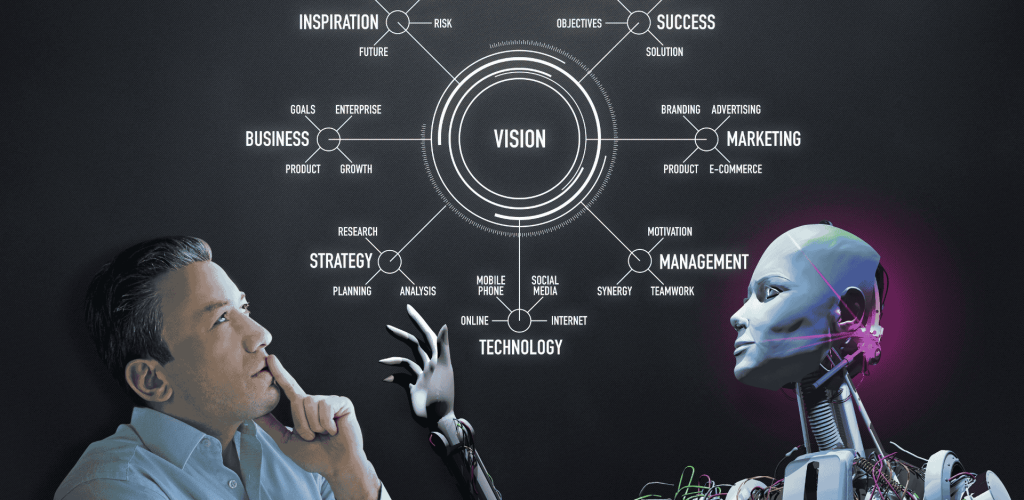
The Future of AI: What Can We Expect in the Next 5 Years?
Artificial Intelligence is advancing at lightning speed. What once felt like science fiction — machines writing stories, diagnosing illnesses, or driving cars — is becoming a reality. But what’s next?
In this blog, we look at the top trends, innovations, and concerns shaping the future of AI between now and 2030.

AI Will Become More Human-Like
Large language models like ChatGPT and image tools like Midjourney are already showing how AI can generate content that feels very human.
In the next five years:
AI assistants will hold deeper conversations
Voice AI will sound more natural and emotional
Tools will write, edit, and create art more creatively
🧠 Expect more AI in writing, filmmaking, customer service, and even therapy.
AI in Healthcare Will Save More Lives
AI is transforming how we detect, treat, and manage diseases.
Coming advancements include:
AI-powered tools to detect cancer, diabetes, and heart disease earlier
Personalized medicine based on genetic data
Virtual health assistants for remote care and mental health
🏥 AI won’t replace doctors — but it will help them make faster, more accurate decisions.
AI Will Change the Way We Work
By 2030, many tasks we do today could be automated or enhanced by AI.
We’ll see:
AI handling data entry, scheduling, and reporting
Smarter tools for coding, design, and marketing
Growth in AI-related jobs: prompt engineers, AI ethicists, data auditors
⚠️ Some jobs will vanish, but new ones will emerge. Upskilling will be key.
Education Will Become More Personalized
AI tutors are already being used in schools and apps like Duolingo. Over the next few years:
Learning platforms will adapt in real time to each student’s level
Teachers will get AI-powered tools to track progress and personalize lessons
Students will learn faster with AI-curated content and feedback
🎓 Education will become more inclusive, accessible, and customized.
Everyday Apps Will Get Smarter
Your favorite apps will quietly become more intelligent and intuitive:
AI-generated summaries in emails and browsers
AI that auto-edits videos, suggests responses, or predicts next actions
Voice assistants that truly understand and anticipate your needs
🤖 You’ll notice fewer “smart” features — because they’ll feel completely natural.
AI and Ethics Will Take Center Stage
As AI grows in power, so do concerns around bias, privacy, and control.
Expect to see:
Governments introducing AI regulations and safety laws
Companies required to be transparent about how AI works
Public debate on AI rights, bias, and misinformation
🔐 Trust will become as important as innovation.
Breakthroughs in AGI Research
Artificial General Intelligence (AGI) — AI that can perform any intellectual task a human can — is still years away, but:
Research is accelerating
Experts are divided: some predict early AGI within a decade
Guardrails will be needed to ensure safety and control
🤯 If AGI arrives, it could change everything — or become the biggest challenge we’ve ever faced.
📊 Summary: What’s Next for AI?
| Area | What to Expect by 2030 |
|---|---|
| Work & Careers | Automation + New AI-driven jobs |
| Healthcare | Faster diagnoses, personalized care |
| Education | Smart tutors, real-time feedback |
| Creativity | AI art, writing, music, and filmmaking |
| Ethics | New laws, safety debates |
| Daily Life | More invisible, helpful AI features |
🙋♂️ FAQs
Q1: Will AI take over most jobs?
Not most — but many repetitive or rule-based jobs could be automated. Humans will still be needed for creativity, leadership, and empathy.
Q2: Can AI become dangerous?
If misused or unregulated, yes. But with the right safety standards and ethical rules, we can keep AI helpful.
Q3: Should I learn AI now?
Absolutely. Whether you’re a student or professional, learning AI basics will help you stay ahead of the curve.
🧠 Final Thoughts
The future of AI is not about replacing humans — it’s about expanding what we can do.
In the next five years, AI will become more human-like, more useful, and more embedded in every part of life. The question is not if AI will change the world — but how we’ll shape it together.
